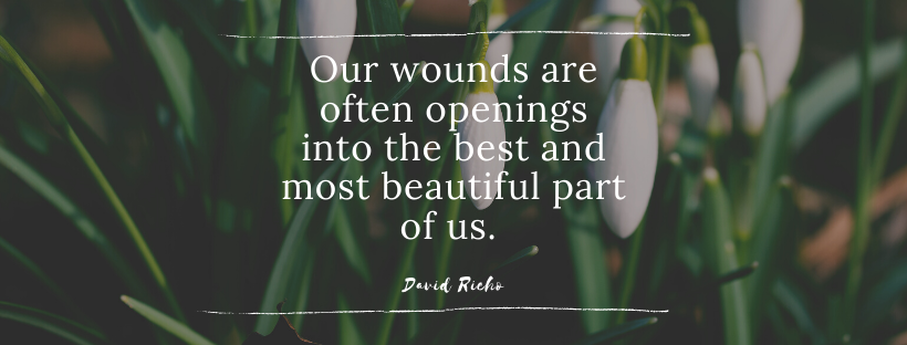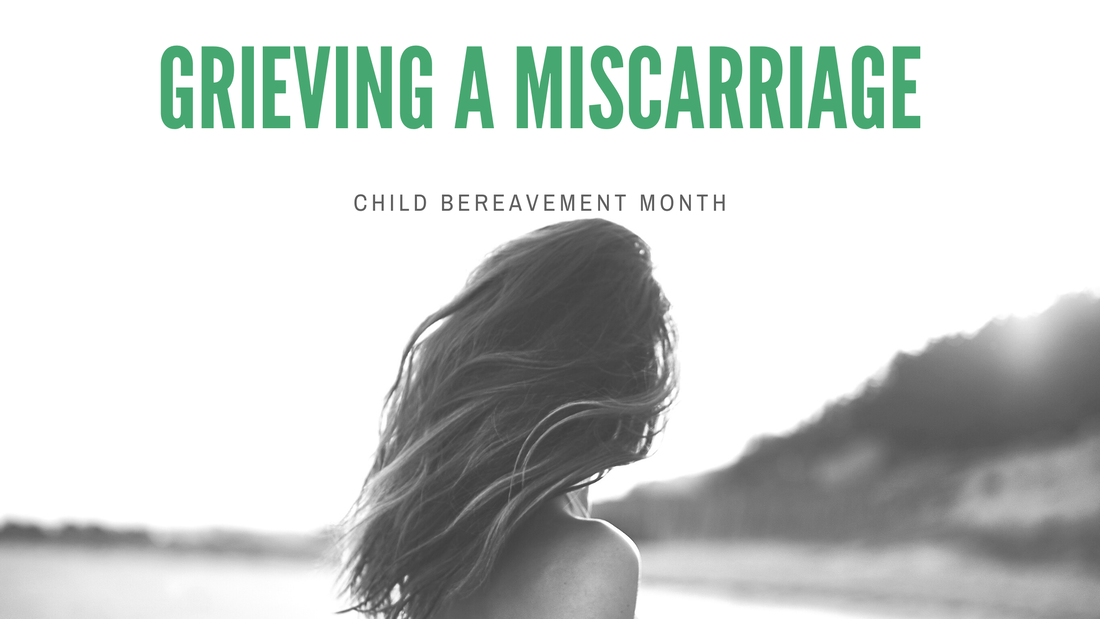|
Trigger Warning; this post discusses grief, miscarriage and stillbirth. Sometimes it's important to process these things by reading about them and sometimes that might not fit where you are emotionally. Honor yourself and take care.
July is Child Bereavement Month About 15-20% of confirmed pregnancies end in a miscarriage. This number is probably even higher as some pregnancies may be miscarried before the person even realizes they are pregnant. For some, a miscarriage is a blip on their journey towards having a baby. For others, a miscarriage is devastating and the grief unbearable. Whatever emotions you are feeling are ok; no one can tell you what to feel or how intense and long this will hurt. There are no "right" ways to grieve the loss of your pregnancy but here are some ideas that may help Find Support Some of us need to process things externally; we might need to talk with others about how we feel in order to sort through them. If this describes you, find your people. Most of us aren't very good at talking about grief and so some people may not respond the way you need them to. Find the people you can talk to though; this may need to be someone else who has gone through a miscarriage, a support group (Facebook has a few really great private groups for this), or even a therapist. It might also be helpful to find someone who doesn't pressure you to talk when you don't want to. Respect Your Feelings A lot of times friends, family members and even medical professionals will treat a miscarriage as no big deal; especially if it was early in the pregnancy others may expect that you weren't very attached yet and can just move on. If you feel like you can, great! And if you don't feel that way, that's ok too! In my experience as a therapist, a lot of people feel like they should get over things faster than they are. This may show up as your grief getting unexpectedly triggered by various events. Respect yourself and your needs. Expect Some Triggers One hard situation a lot of people face after a miscarriage is attending events like baby showers, meeting a friends new baby, or finding out someone else is pregnant. It's ok to have mixed feelings; you can be happy for a friend and want to support them while also reminded of your own loss. You may even find yourself needing to step back from these situations to respect your emotions. Sometimes talking about this with your friends can be helpful, sometimes not; trust your knowledge of yourself and your relationships. Most friends will be understanding if you need some space with these events that you are not "selfish" or "don't care" if you aren't ready. It's also ok if you these events don't increase your grief; it doesn't mean you don't love your baby if you don't feel triggered. If you get pregnant again or have a child after your miscarriage, this may also bring up grief and could be bittersweet; again none of these feelings are wrong or makes you a bad person or parent. It's Ok to Have Mixed Feelings About Getting Pregnant Again After a miscarriage, others may expect you to want to get pregnant again as soon as possible. And maybe this is something you want and feel ready for. For some people, this may bring up a lot of anxiety and it's normal to be fearful of having another miscarriage. It's also ok if you don't feel ready to start trying right away or even ever again. If you have a supportive partner, this can be a really great thing to talk about with them and find a good plan around sex and what next steps and timeline feels right for your family.
0 Comments
Trigger Warning; this post discusses sexual assault and domestic violence/intimate partner violence
Also, I use the word folx which some of you may love and some of you may be so confused about and think the k on my keyboard is broken (don't worry, it's working!); you can find more info about this word here https://forfolxsake.com/what-does-the-term-folx-mean/ Happy Pride! One really important part of Pride for a lot of us is education; education about history of the LGBTQ+ (Lesbian, Gay, Bisexual, Trans and Queer) movement including things like Stonewall or pioneers who lead for civil rights such as Harvey Milk, James Baldwin, and Audre Lorde. Another important focus for a lot of us is recognizing barriers, injustices and mistreatment that impact this group more than others. For me as a therapist that means talking about abuse, mental health and trauma. We know that for queer people abuse is a lot more common, especially for trans folx; 47% of transgender people reported being sexually assaulted according to the 2015 US Transgender Survey. Lesbian and bisexual women also report higher rates of sexual assault than straight women. Domestic violence or intimate partner violence (a term that was changed partially to reflect that people of all genders and types of relationship can experience abuse) also impacts the LGBTQ+ community. While all the types of abuse we see in heterosexual relationship exists too, LGBTQ+ folx can also experience extra homophobia such as being threatened with being "outed" to bosses, parents or other people that may not know. Abusers can also say someone isn't "gay enough," "trans enough" or "queer enough" as a way of emotional abuse that makes someone doubt or feel like they aren't being "gay the right way." An abuser may also threaten that there won't be any services or resources if the survivor choose to leave the relationship. Sadly, this is often the case as a lot of shelters are still only for men or women and don't have services that are safe for queer survivors. But there are some really good resources out there! Sadly, a lot of these are at the national level instead of in local communities especially if you don't live in a major city. Some of the ones I really recommend include -The National Domestic Violence Hotline; 1-800-799-7233 https://www.thehotline.org/ -RAINN (The National Sexual Abuse Hotline); 800-656-4673 https://www.rainn.org/ -The Trevor Project (for LGBTQ Youth); 1-866-488-7386 https://www.thetrevorproject.org/ -FORGE (Trans and Gender Noncomforming Survivors of Abuse); https://forge-forward.org/ Of course, Pride isn't just supposed to be all down and bad things; stay tuned for the second post for Pride focusing on pregnancy and postpartum for same-sex couples and queer folx. Bloom and Thrive.  Trigger Warning; this post mentions rape/sexual assault and abuse You've probably heard the word trauma before; maybe from things like trauma centers for hospitals or about soldiers returning from war. But what does it mean? For us therapist we have an "official" trauma definition from our big diagnosis manual, the DSM. In there, trauma is defined as "exposure to actual or threatened death, serious injury, or sexual violence." That's a lot to take in! And you might be thinking that there are some things that don't quite fit in this definition, for example where would emotional abuse or some types of neglect fit in? As a trauma therapist I like to talk about trauma this way; we like to think of our brain as this orderly place where everything is sorted and stored so we can get memories anytime we want. The more though we learn about memory, we are finding this isn't quite true especially with trauma; for whatever reason these memories don't get stored right. Sometimes with these situations, we maybe felt like we were about ready to fight, run or we just froze up. Because these memories weren't stored right, they sometimes come up at a totally wrong time. An example of this may be for someone who was abused, when they see a stranger who looks like their abuser on the street, their heart beats faster, memories start going through their head and they feel like running. A few things to note about trauma though; first, one thing that is traumatic to one person may not be traumatic to others. Trauma is very subjective which makes it hard for us to make a specific definition. For example, two people may be in the same car accident and one develops trauma symptoms and one doesn't. Second, trauma is super treatable! Since we started researching trauma, we've found a lot of treatments to manage it including types of therapy like EMDR or trauma focused CBT and medication. A lot of people survive through trauma and while they don't forget what happened to them, are able to go on and live happy, fulfilling lives! Are there other things you want to know about trauma? Feel free to leave them in the comments! |
ArchivesCategories
All
|


 RSS Feed
RSS Feed
